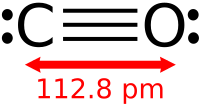
Photo from wikipedia
The efficient electrochemical conversion of carbon dioxide (CO2) to carbon monoxide (CO) using renewable energy is an effective route to pursue carbon neutrality. Optimizing the binding energy of CO on… Click to show full abstract
The efficient electrochemical conversion of carbon dioxide (CO2) to carbon monoxide (CO) using renewable energy is an effective route to pursue carbon neutrality. Optimizing the binding energy of CO on palladium (Pd) metal-based materials used in this process is to make sure the timely desorption of CO from their active sites is critical. Tuning the electronic structure of the Pd center is an effective strategy to optimize its catalytic performance. Herein, we rationally design Pd nanoparticles (NPs)/polymeric carbon nitride (CN) (Pd/CN) composite, which alters the electronic structure of Pd by introducing the interfacial polarization effect to accelerate CO desorption and improve CO selectivity of Pd catalyst. The optimized Pd/CN exhibits a CO Faradaic efficiency of 92.7% at -0.9 V versus reversible hydrogen electrode in CO2-saturated 0.1 M KHCO3 solution. Experimental investigations and theoretical calculations jointly confirm that the enhanced CO selectivity and stability originate from the electron transfer at the Pd/CN interface, and the weakened *CO adsorption on the palladium hydride surface.
Journal Title: ACS applied materials & interfaces
Year Published: 2022
Link to full text (if available)
Share on Social Media: Sign Up to like & get
recommendations!